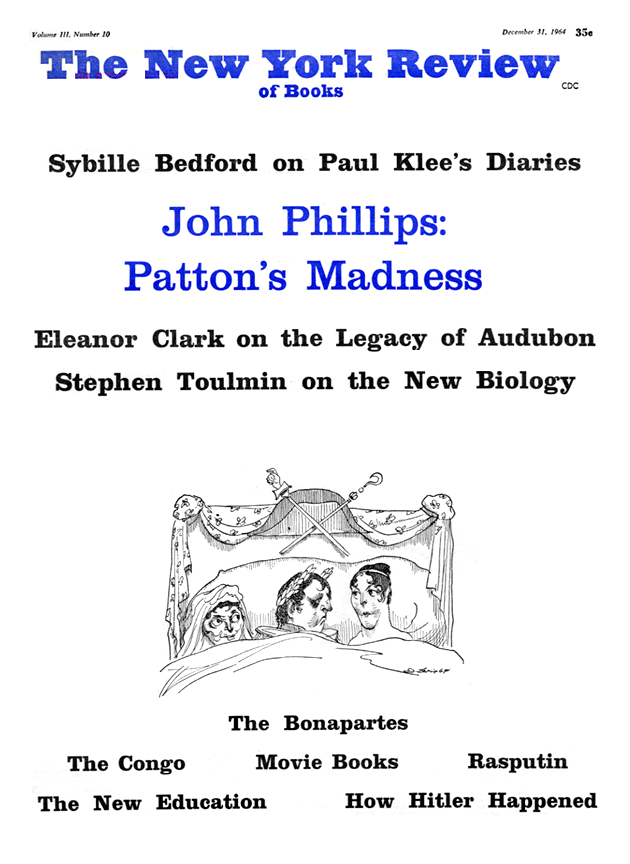In response to:
No Popcorn from the November 19, 1964 issue
To the Editors:
Robert Brustein’s negative views regarding the New York Film Festival (NYR, November 19th) are eminently his privilege, but one must be aware of how his erroneous premise influences his judgments.
Mr. Brustein’s approach is essentially that of a man who takes his drama and literature seriously but who objects to others applying similar seriousness to cinema. He “admits” his “prejudice” of considering films primarily an opportunity for relaxation. They are only “very rarely a high art,” while “on the other hand, what they can do consistently and superlatively is to entertain.” He dislikes “fanatical patrons of the art of films” who watch them in “hushed silence.”
We plead guilty to not having selected Festival films from the viewpoint of “how pleasing it would be to see films where you are able to stretch your length over four seats without. putting a shoe in somebody’s back.”
Mr. Brustein’s premise expresses a rather dated condescension toward the cinema, very prevalent in the middle-aged cultural establishment in Anglo-Saxon countries; it is shared neither by the young cinéasts and critics in these countries, nor by the intelligentsia and cultural establishment of any age in the Latin countries and elsewhere, who regard, as the New York Film Festival organizers do, film as one of the main arts of the twentieth century.
Dreyer, Antonioni, Resnais, Bergman, Griffith, Eisenstein, Renoir, Fellini, Ray will be delighted to hear Mr. Brustein so generously “conceding” that film can be high art. But it is culturally even more relevant to note that—perhaps similar to Eisenhower’s and the Communist Party’s joint rejection of modern art—both the crassest commercial film interests and some high-brow critics agree that the cinema is an “entertainment” and that to refer to it as art is suspect.
By upholding his largely passé viewpoint, Mr. Brustein proves that the possession of a highly developed verbal sense does not necessarily imply a similar development of one’s visual faculties. It has been the bane of cinema art with certain critics as well as the industry that film is predominently considered an excrescence of literature and the theatre. On the contrary, film as an art exists truly only to the extent that it is able to do what other arts cannot do; to paint in time, to force us into largely subconscious associations predetermined along the line of montage by the director by means of carefully structured juxtapositions of images, sequences, objects and movements in space and time within a rectangular frame area.
It is perhaps unfortunate that The New York Review leaves its film criticism to writers whose main concern lies elsewhere and who regard movies primarily as a source of innocent relaxation, a surcease from their more exacting professional duties (and standards) in drama and literature. Conversely, since everybody is capable of evaluating degrees of relaxation, everybody is presumably entitled to be a film critic. Mr. Brustein’s strictures may, therefore, be taken as seriously as would be those of a film critic panning the Formentor prize nominees in a film magazine as being insufficiently “entertaining,” since the function of literature should be to relax the reader…
Amos Vogel
New York City
This Issue
December 31, 1964


